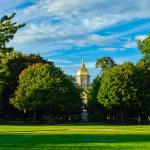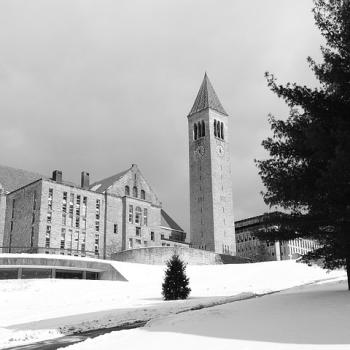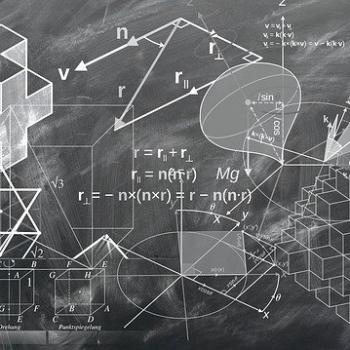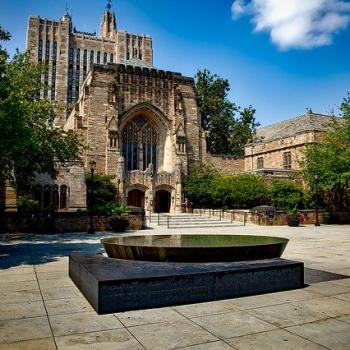 A few days ago, I found myself discussing the state of modern academia with a friend of mine—a doctoral student in political theory at a large research university. My friend remarked that the tenure-track job prospects for new political science Ph.Ds, even those coming from top schools, were increasingly grim. That left me reflecting on the big-picture issues involved—in particular, the structural paradox of American higher education. On one hand, there’s a large and growing pool of potential students, as the nation grows and more people seek degrees. On the other, there’s an enormous “oversupply” of qualified professors.
A few days ago, I found myself discussing the state of modern academia with a friend of mine—a doctoral student in political theory at a large research university. My friend remarked that the tenure-track job prospects for new political science Ph.Ds, even those coming from top schools, were increasingly grim. That left me reflecting on the big-picture issues involved—in particular, the structural paradox of American higher education. On one hand, there’s a large and growing pool of potential students, as the nation grows and more people seek degrees. On the other, there’s an enormous “oversupply” of qualified professors.
The pathologies of the American university system are well known. From the student perspective, tuition prices have skyrocketed, leaving graduates tens of thousands of dollars in debt, and upper-class family life has devolved into an ever-more-breathless competition for the best education. From the teacher perspective, “adjunctification” (the practice of using part-time faculty, paid little more than subsistence wages, to teach most classes) is rampant on university campuses.
Now, if liberal arts education is actually about education in any recognizable sense, this breakdown makes no sense. If there are plenty of students and plenty of teachers, the system should reach equilibrium: if you want to study English with a Harvard-trained professor or philosophy with an NYU-trained one, you can hire one for a fraction of the cost of a degree program (and bring down that cost every further if you pool your resources with a fellow learner). Since students don’t in fact do this, the obvious conclusion is that when people spend hundreds of thousands of dollars on a degree, they’re buying something else.
This line of thinking basically tracks the argument made by George Mason University economist Bryan Caplan in The Case Against Education. Caplan’s book argues (persuasively) that what students are buying isn’t knowledge, but a bare credential whose value increases with its perceived exclusivity.
Where I broadly disagree with Caplan, however, is in his working premise that the value of an education—particularly a liberal arts education—can be meaningfully assigned a dollar amount. Broadly speaking, there’s no way I can know what an education is worth to me, in the fullest and deepest sense, until I’ve reached the end of my life (and perhaps not even then—to the extent that an education in virtue corresponds to increasing conformity to God’s character, the process of “education” is an eternal one and its value is priceless). Since I cannot consistently quantify the value to myself of my own education, I cannot make an exact recommendation to a fellow rational actor at the moment she is poised to make a decision about educational investment.
That is to say: I still think liberal arts education—despite longstanding complaints about the “death of the humanities” or the uselessness of non-STEM education—is a very good thing, and that its value can’t really be calculated in GDP terms. So I don’t think it’s irrational for students to spend money (even substantial sums)buying knowledge—and that stance places me squarely on the side of those who think formal education still has an important place. (No matter how much venture capitalist money they pick up, Coursera and other “massive open online course” platforms will never be a viable substitute for traditional education—there’s simply no personal accountability involved.)
The question then shifts to the university itself: What is it for?
The cynical answer is that the modern university exists for its deans, its administrators, and its sports teams. As public choice theory teaches, institutional stakeholders tend to cling to their own status, resisting changes that might compromise their privileged position. To do this, they must invent justifications for their continued existence. Hence, the bureaucratic bloat that afflicts so many prominent schools.
But, as previously mentioned, I’m not so cynical about education writ large. And so the question persists.
Anthony Kronman’s recent book The Assault on American Excellence provides one interesting, if controversial, attempt to answer it. According to Kronman, the university must forever be a place where those of an intellectual disposition (the “best souls” to paraphrase Plato) may develop and cultivate their capacities for knowledge and reflection. Thus, the university is inherently anti-democratic, designed to help make students “better at being human.” As Hannah Arendt framed it, rational truth is inherently authoritarian; there can be no argument about it once it is revealed. From those broadly “aristocratic” (or anti-egalitarian) premises, Kronman proceeds to defend free speech on campus, critique the deployment of “diversity” rhetoric, and argue against the renaming of historical buildings.
Though Kronman’s arguments don’t range too widely in this new book, his arguments are best read against the backdrop of his prior philosophical work. Kronman’s religious convictions—outlined in detail in his massive Confessions of a Born-Again Pagan—are broadly Spinozist; he adheres to a pantheism that sees all things as essentially divine, but that rejects the notion of a transcendent intellect or will behind the manifold of immanent things. Kronman identifies this vision with the philosophical “paganism” of classical antiquity.
Essential to Spinozism (and classical paganism) is its strict determinism—for all things to be intelligible, they must have been “predestined” (analogically speaking) from all eternity. This is the motive-force behind the tragic fatedness that pervades Greek drama. And it is the linchpin of the essentially anti-democratic vision that so scandalizes some contemporary readers of Plato and Aristotle: by working of fate, some people are just born better than others, and they ought to rule. Kronman’s aristocratic conception of the university—where those who are “better at being human” may come into their own—is profoundly grounded in this metaphysical paradigm.
But in arguing for an aristocratic vision of the university from “pagan” premises, Kronman hands his critics the rope with which to hang him. Kronman is a Sterling Professor at Yale University—the pinnacle of academic aristocracy. He is clearly a thinker who has self-actualized to a very high degree; he is, in essence, one of the people he describes in his book as “better at being human.” And as such, it is not difficult to read The Assault on American Excellence as a defense of the legitimacy of Kronman’s own prestige—nothing more, that is, than a Foucaldian discourse of power. What possible claim to universal legitimacy can that argument have? Put more bluntly, one might say it is quite convenient that someone in Kronman’s esteemed position holds the views he does.
Giving Kronman the benefit of the doubt, though, I read him as assuming the possibility of a unifying theoretical vision for the university, one that goes beyond merely a “discourse of power.” For this to succeed, however, the unifying principle of the university must be something to which all persons in the community are equally oriented, something that can exert an intellectual (and moral) claim on the allegiance of historians and gender studies professors alike.
As it were, I think Yale’s own motto holds the key: lux et veritas—light and truth. The first implicates epistemology: to speak of light in this context is to speak of the possibility of genuine knowledge. The second implicates metaphysics: truth is an absolute ideal, beyond all change and transience, but (thanks to the light) possibly knowable.
This is distinctly theological language—and properly so. What the Christian intellectual tradition recognized, over and beyond the classical tradition, was that human beings are radically equal, in both their finitude and their intrinsic value, before the infinite God. (This, in turn, led the early Christians to adopt lifestyle habits—such as never abandoning unwanted children—that shocked their Roman countrymen.) As a result, all human power relations are forever enfolded within an essentially equalizing relationship—persistent dependence on the Creator. The Creator-creature relation is the true common ground of all disciplines, because all are enfolded within it.
Transposed into the academic register, this means that a necessary aspect of self-actualization—one might alternatively say growth in virtue, or the educational process—is the cultivation of a theological attitude towards perfect Truth. One cannot be a properly realized human without feeling the call of the God who is Truth to know Him more fully; that is to say, desire for Truth—for God—is necessary to human flourishing. And hopefully, that desire leads to the realization that as St. Augustine emphasized, Truth is also always Love, which our love can only echo.
The conclusion this leads to is that the unifying principle of a multidisciplinary university must be something rather like theology— a point Perry Glanzer, Nathan Alleman, and Todd Ream argue, from a rather more Protestant direction, in Restoring the Soul of the University: Unifying Christian Higher Education in a Fragmented Age. I’m not optimistic that the modern research university will internalize this logic.
But it seems to me that a new kind of liberal arts education is slowly but surely emerging. In the last couple of decades, multiple “Great Books” programs—prioritizing close readings of texts in small discussion groups—have emerged as supplements to the traditional campus experience (some now even cater to law students). Unlike the modern university, these programs are all about articulating a cohesive vision of the Good.
Having attended several such programs, I tend to think this is where the future of real, cohesive learning lies. The unique aspects of the experience—the careful selection of participants, the immediate give-and-take of academic discussion, the lack of competitive pressure for grades, the continuing relationships with fellow participants—are simply unmatched, and can’t be duplicated readily in the traditional university setting. Where first principles are concerned, I’ve learned more in a week of seminars than in a year of college classes.
The uniquely postliberal vision I have in mind would involve a large-scale expansion of this model—a way of connecting talented yet underemployed Ph.Ds with students eager to learn (and willing to pay a reasonable price). This would not be a replacement for universities, at least not at first. It would instead be a supplement, or an alternative option for those in careers not requiring a four-year degree. After all, who wouldn’t rather study the classics with someone who actually loves them rather than someone who thinks only of deconstructing them?
Liberal arts education surely doesn’t require fancy buildings, glossy textbooks, and the latest technology—it requires public-domain material, cohesiveness, and personal mentorship. That is the setting in which those who love learning—and the Truth—will genuinely thrive.












